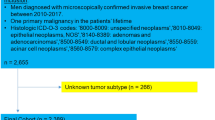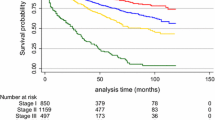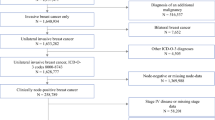Abstract
Background
Fewer than 1% of all breast cancers occur in men. As a result, a distinct lack of data exists regarding the management and outcomes in this cohort.
Methods
Any male patient with pathologically confirmed breast cancer diagnosed between August 2000 and October 2017 at either Massachusetts General Hospital or Brigham and Women’s Hospital/Dana-Farber Cancer Institute and their affiliate satellite locations were included. Primary chart review was used to assess clinical and pathologic characteristics. Patient and treatment variables were reported via descriptive statistics. Local–regional failure (LRF), overall survival (OS), breast cancer-specific survival (BCSS), and disease-free survival (DFS) were estimated using the Kaplan–Meier method.
Results
100 patients were included in this study. Median follow-up was 112 months (range 1–220 months). Approximately 1/3 of patients experienced at least a 3-month delay to presentation. 83 patients ultimately underwent mastectomy as definitive surgical treatment. 46 patients received adjuvant radiation therapy, and 37 patients received chemotherapy. Of 82 hormone receptor-positive patients with invasive cancer, 94% (n = 77) received endocrine therapy. Of the fifty-eight patients who underwent genetic testing, 15 (26%) tested positive. The 5-year OS, BCSS, DFS, and LRF rates were 91.5%, 96.2%, 86%, and 4.8%, respectively. Delay to presentation was not associated with worse survival.
Conclusions
Male breast cancer remains a rare diagnosis. Despite this, the majority of patients in this study received standard of care therapy and experienced excellent oncologic outcomes. Penetration for genetic testing improved over time.



Similar content being viewed by others
References
Seigel RL, Miller KD, Jemal A (2020) Cancer statistics, 2020. CA Cancer J Clin 70(1):7–30
Key Statistics for Breast Cancer in Men (2020) American Cancer Society. Cancer facts & figures 2020. American Cancer Society, Atlanta. https://www.cancer.org/cancer/breast-cancer-in-men/about/key-statistics.html. Accessed 20 Nov 2020
Giordano SH (2018) Breast cancer in men. N Engl J Med 378:2311–2320
Deb S, Lakhani SR, Ottini L, Fox SB (2016) The cancer genetics and pathology of male breast cancer. Histopathology 68:110–118
Cardoso F, Bartlett JMS, Slaets L et al (2018) Characterization of male breast cancer: results of the EORTC 10085/TBCRC/BIG/NABCG international male breast cancer program. Ann Oncol 29:405–417
Yousef AJA (2017) male breast cancer: epidemiology and risk factors. Semin Oncol 44(4):267–272
Gao Y, Heller SL, Moy L (2018) Male breast cancer in the age of genetic testing: an opportunity for early detection, tailored therapy, and surveillance. Radiographics 38(5):1289–1311
Ruddy KJ, Winer EP (2013) Male breast cancer: risk factors, biology, diagnosis, treatment, and survivorship. Ann Oncol 24(6):1434–1443
Serdy KM, Leone JP, Dabbs DJ, Bhargava R (2017) Male breast cancer: a single-institution clinicopathologic and immunohistochemical study. Am J Clin Pathol 147(1):110–119
McKinley N, McCain S, Kirk S (2017) Long term follow up of male breast cancer. Ulster Med J 86(3):177–180
Fentiman IS (2018) The endocrinology of male breast cancer. Endocr Relat Cancer 25(6):R365–R373
NCCN clinical practice guidelines in oncology, version 3.2019. Genetic/Familial High-Risk Assessment: Breast and Ovarian Cancer. https://www.nccn.org/professionals/physician_gls/pdf/genetics_screening.pdf. Accessed 20 Nov 2020
Pritzlaff M, Summerour P, Mcfarland R et al (2016) Male breast cancer in a multi-gene panel testing cohort: insights and unexpected results. Breast Cancer Res Treat 161(3):575–586
Fentiman IS (2016) Male breast cancer is not congruent with the female disease. Crit Rev Oncol Hematol 101:119–124
Fentiman IS (2018) Surgical options for male breast cancer. Breast Cancer Res Treat 172(3):539–544
Losurdo A, Rota S, Gullo G et al (2017) Controversies in clinicopathological characteristics and treatment strategies of male breast cancer: a review of the literature. Crit Rev Oncol Hematol 113:283–291
Korde LA, Zujewski JA, Kamin L et al (2010) Multidisciplinary meeting on male breast cancer: summary and research recommendations. J Clin Oncol 28(12):2114–2122
NCCN clinical practice guidelines in oncology, version 3.2018. Breast Cancer. https://www.nccn.org/professionals/physician_gls/pdf/breast.pdf. Accessed 20 Nov 2020
Leone JP, Leone J, Zwenger AO, Iturbe J, Leone BA, Vallejo CT (2017) Locoregional treatment and overall survival of men with T1a, b, cN0M0 breast cancer: a population-based study. Eur J Cancer 71:7–14
Yala A, Barzilay R, Salama L, Griffin M, Sollender G, Bardia A, Lehman C, Buckley JM, Coopey SB, Polubriaginof F, Garber JE, Smith BL, Gadd MA, Specht MC, Gudewicz TM, Guidi AJ, Taghian A, Hughes KS (2017) Using machine learning to parse breast pathology reports. Breast Cancer Res Treat 161(2):203–211
Desantis CE, Ma J, Sauer AG, Newman LA, Jemal A (2017) Breast cancer statistics, 2017, racial disparity in mortality by state. CA: Cancer J Clin 67(6):439–448
Cedolini C, Bertozzi S, Londero AP et al (2014) Type of breast cancer diagnosis, screening, and survival. Clin Breast Cancer 14(4):235–240
Iqbal J, Ginsburg O, Rochon PA, Sun P, Narod SA (2015) Differences in breast cancer stage at diagnosis and cancer-specific survival by race and ethnicity in the United States. JAMA 313(2):165
Bots SH, Peters SAE, Woodward M (2017) Sex differences in coronary heart disease and stroke mortality: a global assessment of the effect of ageing between 1980 and 2010. BMJ Glob Health 2:e000298
Anderson WF, Jatoi I, Tse J, Rosenberg PS (2010) Male breast cancer: a population-based comparison with female breast cancer. J Clin Oncol 28(2):232–239
Lautrup M, Thorup S, Jensen V et al (2018) Male breast cancer: a nation-wide population-based comparison with female breast cancer. Acta Oncol 57(5):613–621
Joshi MG, Lee AKC, Loda M et al (1996) Male breast carcinoma: an evaluation of prognostic factors contributing to a poorer outcome. Cancer 77(3):490–498
Gnerlich JL, Deshpande AD, Jeffe DB, Seelam S, Kimbuende E, Margenthaler JA (2011) Poorer survival outcomes for male breast cancer compared with female breast cancer may be attributable to in-stage migration. Ann Surg Oncol 18(7):1837–1844
Hagen KB, Aas T, Kvaloy JT, Soiland H, Lind R (2019) Adherence to adjuvant endocrine therapy in postmenopausal breast cancer patients: a 5-year prospective study. Breast 44:52–58
Partridge AH (2006) Non-adherence to endocrine therapy for breast cancer. Ann Oncol 17(2):183–184
Stuckey A, Febbraro T, Laprise J, Wilbur JS, Lopes V, Robison K (2016) Adherence patterns to national comprehensive cancer network guidelines for referral of women with breast cancer to genetics professionals. Am J Clin Oncol 39(4):363–367
Kishan AU, Gomez CL, Dawson NA et al (2016) Increasing appropriate BRCA1/2 mutation testing: the role of family history documentation and genetic counseling in a multidisciplinary clinic. Ann Surg Oncol 23(S5):634–641
Barcenas CH, Shafaee MN, Sinha AK et al (2018) Genetic counseling referral rates in long-term survivors of triple-negative breast cancer. J Natl Compr Cancer Netw 16(5):518–524
Hafertepen L, Pastorino A, Morman N et al (2017) Barriers to genetic testing in newly diagnosed breast cancer patients: Do surgeons limit testing? Am J Surg 214(1):105–110
Funding
The author(s) received no financial support for the research, authorship, and/or publication of this article.
Author information
Authors and Affiliations
Corresponding author
Ethics declarations
Conflict of interest
The authors declare that they have no conflict of interest.
Additional information
Publisher's Note
Springer Nature remains neutral with regard to jurisdictional claims in published maps and institutional affiliations.
Supplementary Information
Below is the link to the electronic supplementary material.
Rights and permissions
About this article
Cite this article
Johnson, A.E., Coopey, S.B., Spring, L.M. et al. Management and outcomes of men diagnosed with primary breast cancer. Breast Cancer Res Treat 188, 561–569 (2021). https://doi.org/10.1007/s10549-021-06174-y
Received:
Accepted:
Published:
Issue Date:
DOI: https://doi.org/10.1007/s10549-021-06174-y




